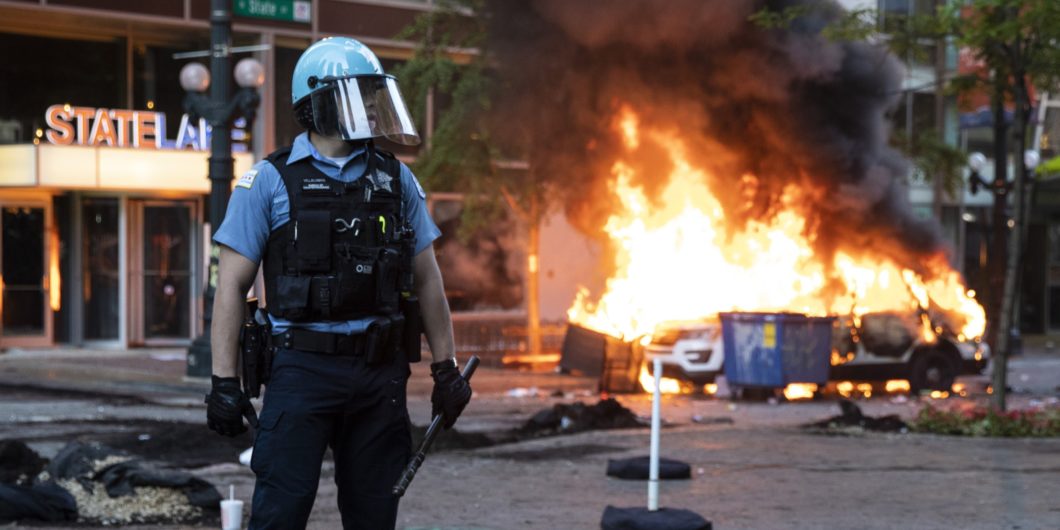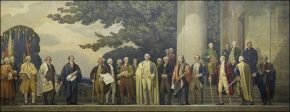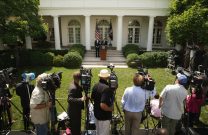Between Us and the State of Nature
Government in America today does many things. It builds roads, educates and feeds our children, supplies housing to millions, and gives living assistance to older citizens. And this is just the start of its vast array of responsibilities. Important as these activities are, however, none of them provides the primary reason why people instituted a government in the first place.
This reason was perhaps best described by the English political philosopher John Locke, author of the Second Treatise on Civil Government. Published in 1689, some 80 years before the events that led to the American Revolution, Locke’s Treatise was the most widely read book in America in the 1770s, the Bible excepted. It still deserves our attention today. The work speaks directly to the inchoate movement currently roiling the nation, which calls for defunding (or disbanding) police forces and demands using the money recovered to “invest in people” and adopt “a holistic model of public safety.”
John Locke takes us in a different direction. All human beings, he argued, possess a set of drives or instincts that lead them to try to preserve their lives and security, safeguard their liberty, and protect what they have worked to attain. The simple name Locke gives to these instincts are life, liberty, and estate (or property), from which the famous words of the Declaration, slightly revised, are drawn: “life, liberty, and the pursuit of happiness.” These drives represent the first things people care about when they approach politics. They are the basis of our natural rights, “natural” because they derive directly from man’s makeup or constitution. John Quincy Adams rephrased this idea, derived from Locke and the Declaration, when he wrote in 1821 that Americans “proclaimed to mankind the inextinguishable rights of human nature, and the only lawful foundations of government.”
The challenge Locke faced was to figure out how to maximize the prospects of securing these basic rights. People must agree, he reasoned, to a social contract setting up a government that assures fair policing and proper judging and punishing. A neutral force would stand above all individuals and have the authority and power to restrain those of criminal inclination. It would also dissuade the many who, in the absence of police, might act on their own out of uncertainty to protect a possible assault on their rights. A feeling of calm and certainty should prevail, which is a primary goal of government itself. People can survive roads with potholes and even live without an education, but they will always need police and a system of justice.
“[The] lawless in spirit . . . [are] encouraged to become lawless in practice; and having been used to no restraint, but dread of punishment, they thus become, absolutely unrestrained.”
Abraham Lincoln, “Lyceum Address”
Think of what the protection of law means to an ordinary citizen. In one scenario, a person happens to find himself alone late at night in a dangerous section of town. Peering over his shoulder, in fear being of robbed or assaulted, he is gripped with the sudden disquiet of knowing that he could not call in time to receive the government’s protection. There is no effective 911. This psychological position is akin to finding oneself in what Locke calls a “state of nature,” a circumstance without a superior force that safeguards citizens and discourages wrongdoing. Law-abiding people who fear being in such a state are beginning to think of how they might react in encountering a lawless environment. Some, as so many New Yorkers are now doing, will doubtless search for a house in the Hamptons, while others, maybe as a last resort, will run out to purchase a handgun.
Looking back in American history, no one more vividly described the effects of the breakdown of law than the young Abraham Lincoln. In 1838, with a mobocratic spirit growing in the states of the West and South, Lincoln spoke of a condition in which “all the walls erected for the defense of the persons and property of individuals, are trodden down, and disregarded.” He went on to focus on the “lawless in spirit,” who are “encouraged to become lawless in practice; and having been used to no restraint, but dread of punishment, they thus become, absolutely unrestrained. Having ever regarded Government as their deadliest bane, they make a jubilee of the suspension of its operations; and pray for nothing so much, as its total annihilation.” A jubilee of the suspension of government is the state of nature on steroids that Locke sought to avoid.
Nothing is extraordinary or shameful in people worrying about this breakdown of law. For example, in the normally quiet environment of the University of Virginia in Charlottesville, many came to worry for their safety following a spate of reported assaults and rapes a few years ago. Administrators responded at first by having the police send out regular warnings of danger zones, by supplying transport to students at any hour, and by offering lessons in self-defense. All of these steps were preparatory to employing a large new private security force, euphemistically labeled the “ambassadors” (though none issued visas or attended late-afternoon cocktail parties). The fine personnel in this force were assigned to patrol, at all hours, every corner of the university and its surrounding residential areas, deterred by neither snow nor rain nor heat nor gloom of night, adding another layer of security to the regular police forces. As students have begun to feel safer, they forget about safety and view security forces more as a problem than a solution. Protesters last week joined the national movement against the police by calling for “the need to defund the Charlottesville, Albemarle County and University of Virginia police departments.”
Policing, of course, presents problems of its own. A force that regularly acts unfairly against segments of the public is as bad or worse than having no force at all, as the gruesome murder of George Floyd illustrates. At other moments, though, Americans have demanded greater rigor and more policing to provide protection against sexual assault, school shootings, and the destruction of buildings and property, from which the livelihood of many derives. With more policing, however, it is impossible to avoid all wrongdoing. The more people randomly disrespect and attack the police, the fewer qualified persons there will be who choose this profession. Better training, along with some changes in police union regulations, can make things better, but never perfect. In the end, people need to have police. As John Locke made clear, it is the reason why we have government.


